BOOKS
Defining Policy Analysis: A Journey that Never Ends
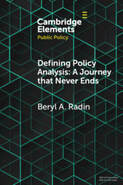
For much of its life, the field of policy analysis has lived with a wide range of definitions of its goals, work, and significance in the society. Defining Policy Analysis: A Journey that Never Ends seeks to sort out these differences by describing the issues, players, and developments that have played a role over the life of this field. As a result of the relationships that have developed, an environment has emerged where both academics and practitioners who self-identify as “policy analysts” are not always recognized as such by others who use that same label.
This work, published in the series Elements in Public Policy by Cambridge University Press, explores the reasons why this conflictual situation has developed and whether the current status is a major departure from the past. While these developments may not be new or found only in policy analysis, they do have an impact on the status of the academics as well as the practitioners in the field.
Available from Cambridge University Press.
This work, published in the series Elements in Public Policy by Cambridge University Press, explores the reasons why this conflictual situation has developed and whether the current status is a major departure from the past. While these developments may not be new or found only in policy analysis, they do have an impact on the status of the academics as well as the practitioners in the field.
Available from Cambridge University Press.
Policy Analysis in the Twenty-First Century: Complexity, Conflict, and Cases, 1st Edition
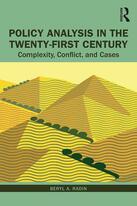
The field called policy analysis focused originally on the formulation of new policies and was structured to give advice to those in the top reaches of government agencies. Within several decades the field moved beyond the formulation stage of the policy process (creating new policies) to agenda setting, implementation, and evaluation of existing policies. New skill sets emerged and staff were found in many parts of the policy world. Despite these changes, there has been little attention paid to the possible shifts in the relationship between analysts and clients, and students of policy analysis often enter the world of work with little exposure to the situations they might face.
Policy Analysis in the Twenty-First Century, published by Routledge in 2019, is designed to familiarize students with the diversity of experiences that they can expect to face in their practitioner role. Author Beryl Radin bases the discussion on case studies that illustrate realities in the current policy analysis environment and demonstrate the volatility and complexity of decision environments. Players in the cases illustrate three different stages of a career (beginning the career, mid-career, and people at the end of their career). This book will be required reading for faculty and masters level students in both public management and policy analysis classes. It may also be used in executive programs.
Available from Routledge and Amazon.com.
Policy Analysis in the Twenty-First Century, published by Routledge in 2019, is designed to familiarize students with the diversity of experiences that they can expect to face in their practitioner role. Author Beryl Radin bases the discussion on case studies that illustrate realities in the current policy analysis environment and demonstrate the volatility and complexity of decision environments. Players in the cases illustrate three different stages of a career (beginning the career, mid-career, and people at the end of their career). This book will be required reading for faculty and masters level students in both public management and policy analysis classes. It may also be used in executive programs.
Available from Routledge and Amazon.com.
"For over a half-century, Beryl Radin has been the conscience and chronicler of the disciplines of policy analysis and public administration. Always cognisant of the messy realities of policy practice, she is a renowned scholar and teacher whose writings are both prodigious and prolific, chief among which is Beyond Machiavelli (2000), her influential retrospective on the rise of the policy analysis profession. Radin’s long experience tells her that the policy world has altered, perhaps irrevocably, and the policy profession, and especially the training of policy professionals, needs to change with it. This book places these concerns on the record. And policy researchers and teachers would do well to take note."
-Michael Di Francesco, Australian Journal of Public Administration
"Radin draws on her extensive scholarship and experience to produce a book that will be very valuable for those entering, or considering entering, the increasingly diverse field of policy analysis. By conveying the many contexts in which policy analysts practice, the book’s cases will help aspiring analysts better match their personal values to the varieties of roles available in the policy making process."
-David L. Weimer, University of Wisconsin–Madison, US
"Radin’s engaging approach presents policy analysis as highly diverse, in terms of what advisors/analysts do from positions in and outside government, and in terms of the clients they serve. With insightful cases, the book does great justice to major challenges to policy analysis in the everyday practice of policy advice across the globe."
-Marleen Brans, KU Leuven Public Governance Institute, Belgium and Vice-President of the International Public Policy Association
"The field of Public Policy Analysis has increasingly drawn upon abstract models of technical analysis oblivious to practical relevance to public problem-solving and to the challenges involved in wading through the increasingly complex policy world. Beryl Radin, with the distillation of the rich experience of her career as a "pracademic," combined with a set of masterfully crafted cases, presents an insightful and highly readable account of how Public Policy Analysis can best be studied and practiced in response to challenges of the 21st century world."
-Wai-Fung Lam, University of Hong Kong, China
"As a public policy consultant for multinational organizations, I have been involved in programs that provide policy recommendations to governments at all levels of China. If I had seen a book like Prof. Beryl Radin's during my academic career, I would have been more prepared to deal with the issues that occurred at work."
-Lina Li, Central University of Finance and Economics, China
LEAVING SOUTH DAKOTA: A MEMOIR OF A JEWISH FEMINIST ACADEMIC, Mascot Books, 2017
ISBN: 978-1-68401-108-7
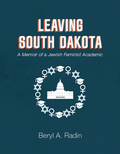
Leaving South Dakota is the tale of Beryl Radin and her experience growing up as a first generation Jewish American in the Midwest. From her small Jewish community of Aberdeen, South Dakota, to her career as a successful academic and professor in and out of Washington D.C., Radin weaves together the threads of a life composed by fragments of feminism, civil rights, Americanization, and activism.
Spanning eight decades, Radin’s memoir offers a vision of the twentieth century through the lens of a woman defined by multiple identities attempting to define her place in a shifting world." Available from Mascot Books and Amazon.com.
Spanning eight decades, Radin’s memoir offers a vision of the twentieth century through the lens of a woman defined by multiple identities attempting to define her place in a shifting world." Available from Mascot Books and Amazon.com.
“Beryl Radin has written an affecting memoir of her life and career. As a fellow South Dakotan, I have lived parts of her story myself and know where she began and how she has flourished from that base.”
-Paul Light, Professor, Wagner School of Public Service, New York University
“Beryl’s fascinating and entertaining memoir offers wonderful insights on her highly productive and important career. Her book provides many interesting reflections on her professional and personal choices that were shaped by her family, education, and Jewish faith as well as feminism and the civil rights movement.”
-Steven Rathgeb Smith, Executive Director, American Political Science Association
“This is a beautiful and powerful memoir of an extraordinarily wise academic and practitioner whose life has spanned over seven decades. This book will make you laugh out loud.”
-Norma Riccucci, Professor, Rutgers University
BEYOND MACHIAVELLI: POLICY ANALYSIS REACHES MIDLIFE, Second Edition, Georgetown University Press, 2013
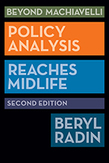
In this new edition of Beyond Machiavelli, Beryl Radin updates her popular overview of the field of policy analysis. Radin, winner of the John Gaus Award from the American Political Science Association, considers the critical issues that confront the policy analysis practitioner, changes in the field, including the globalization of policy analysis, and the dramatic changes in the policy environment. She examines schools and careers; the conflict between the imperatives of analysis and the world of politics; the analytic tools that have been used, created, or discarded over the past fifty years; the relationship between decision makers and analysts as the field has multiplied and spread; and the assumptions about the availability and appropriateness of information that can be used in the analytic task.
Once found largely in the United States, policy analysis has become global, and Radin discusses the field's new paradigms, methodologies and concepts of success. This new edition considers changes in expertise, controversies in the field, today's career prospects, and the impact of 9/11 on the field. She profiles three additional policy analysis organizations and updates the profiles of the organizations in the first edition. Continuing the trajectory of the fictional characters from the first edition, Radin adds a character representing the new generation just entering the field. The book discusses the shifts in society's attitudes toward public action, the availability of resources to meet public needs, and the dimensions of policymaking.
Written for students, faculty, and practitioners, the book concludes with a look at the possible dimensions of the policy analysis field and profession as it moves into the future.
Once found largely in the United States, policy analysis has become global, and Radin discusses the field's new paradigms, methodologies and concepts of success. This new edition considers changes in expertise, controversies in the field, today's career prospects, and the impact of 9/11 on the field. She profiles three additional policy analysis organizations and updates the profiles of the organizations in the first edition. Continuing the trajectory of the fictional characters from the first edition, Radin adds a character representing the new generation just entering the field. The book discusses the shifts in society's attitudes toward public action, the availability of resources to meet public needs, and the dimensions of policymaking.
Written for students, faculty, and practitioners, the book concludes with a look at the possible dimensions of the policy analysis field and profession as it moves into the future.
"The first edition of Beyond Machiavelli was an important and valuable book for those of us seeking to understand the role of analysis in the policy-making process. The second edition adds to that value by extending assessment to the contemporary period of increased globalization, sharpened political polarization, and ever more complex organizational environments. This book should be read by all policy analysts and the researchers who study them."
—David L. Weimer, Edwin E. Witte Professor of Political Economy, University of Wisconsin-Madison
FEDERAL MANAGEMENT REFORM IN A WORLD OF CONTRADICTIONS, Georgetown University Press, 2012
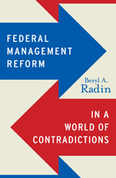
Proposals for reform have dotted the federal management landscape in the United States for more than 50 years. Yet these efforts by public management professionals have frequently failed to produce lasting results. In her new book, Federal Management Reform in a World of Contradictions, renowned public administration scholar Beryl A. Radin reveals what may lie behind the failure of so many efforts at government management reform.
To spur new thinking about this problem, Radin examines three basic sets of contradictions between the strategies of the reformers and the reality of the US federal system: contradictions in the shared powers structure, contradictions in values, and contradictions between politics and administration. She then explores six types of reform efforts and the core beliefs that guided them. The six reform areas are contracting out, personnel policy, agency reorganization, budgeting, federalism policies and procedures, and performance management. The book shows how too often these prescriptions for reform have tried to apply techniques from the private sector or a parliamentary system that do not transfer well to the structure of the US federal system and its democratic and political traditions.
Mindful of the ineffectiveness of a "one-size-fits-all" approach, Radin does not propose a single path for reform, but calls instead for a truly honest assessment of past efforts as today's reformers design a new conceptual and strategic roadmap for the future.
To spur new thinking about this problem, Radin examines three basic sets of contradictions between the strategies of the reformers and the reality of the US federal system: contradictions in the shared powers structure, contradictions in values, and contradictions between politics and administration. She then explores six types of reform efforts and the core beliefs that guided them. The six reform areas are contracting out, personnel policy, agency reorganization, budgeting, federalism policies and procedures, and performance management. The book shows how too often these prescriptions for reform have tried to apply techniques from the private sector or a parliamentary system that do not transfer well to the structure of the US federal system and its democratic and political traditions.
Mindful of the ineffectiveness of a "one-size-fits-all" approach, Radin does not propose a single path for reform, but calls instead for a truly honest assessment of past efforts as today's reformers design a new conceptual and strategic roadmap for the future.
"This incisive, revelatory book challenges the way in which academics as well as practitioners have tackled the problems associated with public management reform. Radin aptly suggests that, like a computer stuck in a reboot loop, management reform has been treated like an old chestnut, never advancing nor improving because of a failure to account for the problems associated with the implementation of reforms, most prominently those stemming from politics. Radin's book is extraordinarily insightful, and should be required reading in every public administration program."
—Norma M. Riccucci, Rutgers University, Newark
Book Reviews
Federal Management Reform in a World of Contradictions, by Beryl Radin, Washington, DC: Georgetown University Press, 2012, 205 pp.
Reviewed by Paul L. Posner, George Mason University, Fairfax, VA
PUBLIUS: THE JOURNAL OF FEDERALISM, Advance Access published July 12, 2013
Reviewed by Paul L. Posner, George Mason University, Fairfax, VA
PUBLIUS: THE JOURNAL OF FEDERALISM, Advance Access published July 12, 2013
Federal Management Reform in a World of Contradictions, by Beryl Radin, Washington, DC: Georgetown University Press, 2012, 205 pp.
Reviewed by: Se Yeon Hwang, GSPIA, University of Pittsburgh
JOURNAL OF COMPARATIVE POLICY ANALYSIS: RESEARCH AND PRACTICE, Vol.16, Number 2, 2014
Reviewed by: Se Yeon Hwang, GSPIA, University of Pittsburgh
JOURNAL OF COMPARATIVE POLICY ANALYSIS: RESEARCH AND PRACTICE, Vol.16, Number 2, 2014
WHAT DO WE EXPECT FROM OUR GOVERNMENT? Edited with Joshua M. Chanin. Published by Lexington Books, 2010
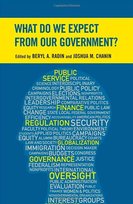
Much has changed in US politics since the historic 2008 election. While the press covers the actions and agendas of the new administration, other impacts of this political shift have not received as much attention. These changes have forced the nation to rethink the necessary role of government, the role of the private market, the impact of science, technology, and information, and, ultimately, our place in the world.
What Do We Expect From Our Government? provides a glimpse at this set of developments by focusing on a number of policies, such as climate change, immigration, and terrorism, as well as governance processes such as oversight, elections and campaigns, and regulation. It highlights the role of research in public sector decision-making, the role of the academy, the relationship between economic imperatives and scientific information, and dealing with uncertainty and change. In addition, it includes attention to broader issues such as national economic and fiscal policies and strategies for assuring equity and access in programs.
What Do We Expect From Our Government? provides a glimpse at this set of developments by focusing on a number of policies, such as climate change, immigration, and terrorism, as well as governance processes such as oversight, elections and campaigns, and regulation. It highlights the role of research in public sector decision-making, the role of the academy, the relationship between economic imperatives and scientific information, and dealing with uncertainty and change. In addition, it includes attention to broader issues such as national economic and fiscal policies and strategies for assuring equity and access in programs.
FEDERAL GOVERNMENT REORGANIZATION: A POLICY AND MANAGEMENT PERSPECTIVE, with Joshua M. Chanin, Jones and Bartlett Publishers, 2009

This textbook reader discusses the importance of organization and reorganization in the contemporary structure of the American federal government. First, it deals with the decision to change structural arrangements within the bureaucracy. Through a range of conceptual readings, it explores why reorganization and changing the structure of government continues to happen, allowing the reader to understand the multiple and often conflicting goals involved in changing organizational structure. It highlights two contrasting approaches to reorganization: a management approach and a policy approach. Secondly, it discusses the consequences of reorganization activity by focusing on the results of a number of federal government reorganizations. The examples include the U.S. Department of Homeland Security, the U.S. Department of Defense, the U.S. Department of Education, and proposals to establish a U.S. Department of Food Safety. This is an idea text for courses in public management, public policy, and political science courses covering the Presidency and Congress.
CHALLENGING THE PERFORMANCE MOVEMENT; ACCOUNTABILITY, COMPLEXITY AND DEMOCRATIC VALUES, Georgetown University Press, 2006
"Beryl Radin has produced an important and timely challenge to the current orthodoxy in some political and academic circles about performance measurement. The 'performance movement', especially in the US and other 'anglo' countries, has all too often relied on simplistic, overly rational, value-free and linear assumptions about what performance means in a public service context. Dr. Radin effectively challenges all these assumptions and shows the paradoxes that underpin them. Most importantly, she offers an alternative vision which does not reject performance measurement out of hand, as some have, but instead seeks to re-found it in a democratic, pluralistic and accountable context. A well grounded and enjoyable 'must read' for anyone interested in this field."
—Colin Talbot, chair of Public Policy and Management, Manchester Business School, University of Manchester
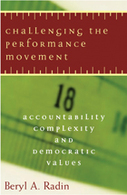
"Accountability" is a watchword of our era. Dissatisfaction with a range of public and private institutions is widespread and often expressed in strong critical rhetoric. The reasons for these views are varied and difficult to translate into concrete action, but this hasn't deterred governments and nongovernmental organizations from putting into place formal processes for determining whether their own and others' goals have been achieved and problems with performance have been avoided.
In this thought-provoking book, government and public administration scholar Beryl Radin takes on many of the assumptions of the performance movement, arguing that evaluation relies too often on simplistic, one-size-fits-all solutions that are not always effective for dynamic organizations. Drawing on a wide range of ideas, including theories of intelligence and modes of thought, assumptions about numbers and information, and the nature of professionalism, Radin sheds light on the hidden complexities of creating standards to evaluate performance. She illustrates these problems by discussing a range of program areas, including health efforts as well as the education program, "No Child Left Behind."
Throughout, the author devotes particular attention to concerns about government standards, from accounting for issues of equity to allowing for complicated intergovernmental relationships and fragmentation of powers. She explores in detail how recent performance measurement efforts in the U.S. government have fared, and analyzes efforts by nongovernmental organizations both inside and outside of the United States to impose standards of integrity and equity on their governments. The examination concludes with alternative assumptions and lessons for those embarking on performance measurement activities.
In this thought-provoking book, government and public administration scholar Beryl Radin takes on many of the assumptions of the performance movement, arguing that evaluation relies too often on simplistic, one-size-fits-all solutions that are not always effective for dynamic organizations. Drawing on a wide range of ideas, including theories of intelligence and modes of thought, assumptions about numbers and information, and the nature of professionalism, Radin sheds light on the hidden complexities of creating standards to evaluate performance. She illustrates these problems by discussing a range of program areas, including health efforts as well as the education program, "No Child Left Behind."
Throughout, the author devotes particular attention to concerns about government standards, from accounting for issues of equity to allowing for complicated intergovernmental relationships and fragmentation of powers. She explores in detail how recent performance measurement efforts in the U.S. government have fared, and analyzes efforts by nongovernmental organizations both inside and outside of the United States to impose standards of integrity and equity on their governments. The examination concludes with alternative assumptions and lessons for those embarking on performance measurement activities.
Book Reviews
Challenging the Performance Movement: Accountability Complexity and Democratic Values. by Beryl Radin, Washington, DC: Georgetown University Press, 2006, 260 pp.
Reviewed by: Lawrence Lynn, Texas A&M
JOURNAL OF PUBLIC ADMINISTRATION: RESEARCH AND THEORY
Reviewed by: Lawrence Lynn, Texas A&M
JOURNAL OF PUBLIC ADMINISTRATION: RESEARCH AND THEORY
THE ACCOUNTABLE JUGGLER: THE ART OF LEADERSHIP IN A FEDERAL AGENCY, Congressional Quarterly Press, 2002
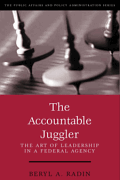
How should a manager handle different accountability expectations? While a commonplace term in government lexicon, accountability has escaped precise definition, leaving managers at a disadvantage when trying to monitor the performance of their programs.
Including more than 300 programs, over 60,000 employees, and a budget of over $400 billion, the U.S. Department of Health and Human Services is an ideal canvas for starkly illustrating competing accountability demands. With a bird's-eye view of the agency's inner workings, Radin tackles big issues such as strategies of centralization and decentralization, coordination with states and localities, leadership, and program design, while using the apt analogy of a juggler to show how managers must keep in the air disparate demands and developments.
Including more than 300 programs, over 60,000 employees, and a budget of over $400 billion, the U.S. Department of Health and Human Services is an ideal canvas for starkly illustrating competing accountability demands. With a bird's-eye view of the agency's inner workings, Radin tackles big issues such as strategies of centralization and decentralization, coordination with states and localities, leadership, and program design, while using the apt analogy of a juggler to show how managers must keep in the air disparate demands and developments.
BEYOND MACHIAVELLI: POLICY ANALYSIS COMES OF AGE, Georgetown University Press, 2000
Translated into Chinese and published by Wu-Nan Book. Inc. 2004
"The book is clear, logical, engaging, and straightforward. . . . If one had only a single book to read about the evolution of policy analysis, this would be a very wise pick. It will be a great boon to master of public administration and master of public policy students who want to get a quick and painless, but very strong grip on the field and its issues. Radin has done the field of policy analysis a great service."
—Public Administration Review
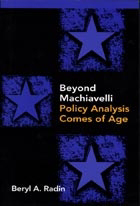
Policy analysis is a relatively young field, created in the 1960s as a way to introduce data and rationality into the decision-making process. In Beyond Machiavelli, Beryl A. Radin compares policy analysis in the 1960s with its practice in the 1990s, analyzing the transformations the profession has undergone since its birth and offering a provocative conception of its practice today.
All new professions go through a maturation process, but Radin points out that policy analysis is more susceptible to change because it is directly affected by shifting political values. The United States of the 1960s was characterized by a strong belief in progress, a trust in the public sector, and a reliance on experts. By the 1990s, Americans were less confident about the future, not as trustful of the government, and less willing to defer to so-called experts. Even so, the number and range of policy analysis jobs has grown markedly.
Radin explores the significant changes that have taken place in the field, including attitudes toward politics, skills and methodologies required, views about information and data, and shifts in modes of decision making. She includes profiles of six very diverse policy analysis organizations to illustrate these changes. While some argue that the 1960s were the golden day of the profession when decision makers listened to experts, Radin argues that the earlier version of the field held to traditions of elitism and secrecy and that policy analysis in the 1990s, pluralistic and open, is a more democratic American profession.
See more at: http://press.georgetown.edu/book/georgetown/beyond-machiavelli#sthash.GXfMzF1C.dpuf
All new professions go through a maturation process, but Radin points out that policy analysis is more susceptible to change because it is directly affected by shifting political values. The United States of the 1960s was characterized by a strong belief in progress, a trust in the public sector, and a reliance on experts. By the 1990s, Americans were less confident about the future, not as trustful of the government, and less willing to defer to so-called experts. Even so, the number and range of policy analysis jobs has grown markedly.
Radin explores the significant changes that have taken place in the field, including attitudes toward politics, skills and methodologies required, views about information and data, and shifts in modes of decision making. She includes profiles of six very diverse policy analysis organizations to illustrate these changes. While some argue that the 1960s were the golden day of the profession when decision makers listened to experts, Radin argues that the earlier version of the field held to traditions of elitism and secrecy and that policy analysis in the 1990s, pluralistic and open, is a more democratic American profession.
See more at: http://press.georgetown.edu/book/georgetown/beyond-machiavelli#sthash.GXfMzF1C.dpuf
THE CHANGING ROLE OF THE ALL-INDIA SERVICES, Edited with Balveer Arora, Center for the Advanced Study of India University of Pennsylvania and Centre for Policy Research, New Delhi, 2000
NEW GOVERNANCE FOR RURAL AMERICA: CREATING INTERGOVERNMENTAL PARTNERSHIPS, with Robert Agranoff, Ann Bowman, C. Gregory Buntz, Steven Ott, Barbara Romzek and Robert Wilson, University Press of Kansas, 1996
"This is an excellent addition to our understanding of rural development and intergovernmental management. Its solid scholarship, enlightened conceptual framework, and clear writing style make it a welcome addition to the field of public policy and administration."
--B. J. Reed, University of Nebraska at Omaha
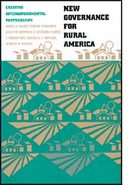
Throughout the 1990s public demand for a fundamental shift in the relationship between government and its citizens has intensified. In response, a "new governance" model has emerged, emphasizing decreased federal control in favor of intergovernmental collaboration and increased involvement of state, local, and private agencies.
As the authors of this volume show, one of the best examples of "new governance" can be found in the National and State Rural Development Councils (NRDC and SRDC), created in 1990 as the result of President Bush's Rural Development Initiative and now called the Rural Development Partnership. This effort was part of a move within policymaking circles to redefine a rural America that was no longer synonymous with family farming and that required innovative new solutions for economic revival. By 1994 twenty-nine states had created and ten other states were in the process of forming such councils.
In this first detailed analysis of the NRDC and SRDCs, the authors examine the successes and failures of the original eight councils in Kansas, Maine, Mississippi, Oregon, South Carolina, South Dakota, Texas, and Washington; as well as eight other councils subsequently created in Iowa, New Mexico, North Carolina, Vermont, New York, North Dakota, Utah, and Wyoming.
Combining empirical analysis with current theories about networks and inter-organizational relations, this volume should appeal to academics and practitioners interested in rural development policy, public administration, public policy and management, and intergovernmental relations.
As the authors of this volume show, one of the best examples of "new governance" can be found in the National and State Rural Development Councils (NRDC and SRDC), created in 1990 as the result of President Bush's Rural Development Initiative and now called the Rural Development Partnership. This effort was part of a move within policymaking circles to redefine a rural America that was no longer synonymous with family farming and that required innovative new solutions for economic revival. By 1994 twenty-nine states had created and ten other states were in the process of forming such councils.
In this first detailed analysis of the NRDC and SRDCs, the authors examine the successes and failures of the original eight councils in Kansas, Maine, Mississippi, Oregon, South Carolina, South Dakota, Texas, and Washington; as well as eight other councils subsequently created in Iowa, New Mexico, North Carolina, Vermont, New York, North Dakota, Utah, and Wyoming.
Combining empirical analysis with current theories about networks and inter-organizational relations, this volume should appeal to academics and practitioners interested in rural development policy, public administration, public policy and management, and intergovernmental relations.
THE POLITICS OF FEDERAL REORGANIZATION: CREATING THE U.S. DEPARTMENT OF EDUCATION (with Willis D. Hawley), Pergamon Press, l988
